
Chip War: the Fight for the World's Most Vital Technology and the Staggering Vulnerability of the U.S.
The world as we know it relies on computer chips, and the most important ones are made largely in Taiwan. This renders the U.S. shockingly vulnerable as China continues saber rattling in the region. Don’t miss this enlightening talk with economic historian and author Chris Miller.

A Mind-Blowing Look at How Our Brains Create Our Reality. With Renowned Neuroscientist Lisa Feldman Barrett
Our brains run the show and determine how we relate to the world. Discoveries from the front lines of neuroscience show our brains are creators (as opposed to spectators) of reality and also creator of our emotions. Don’t miss this enlightening talk with Lisa Feldman Barrett, one of the world’s most cited scientists for her groundbreaking research in psychology and neuroscience.

What Does the Work of The Future Look Like? With MIT Professor David Autor
Why will tech and automation never lead to the demise of human work? What qualifies as “good” work? What role will robots and AI play in the fast-approaching future? David Autor, MIT professor and co-chair of the MIT Task Force on The Work of The Future, provides answers in this riveting and enlightening conversation.

Is This Time Different? Eight Centuries of Financial Folly with Famed Economist Ken Rogoff
Harvard economics professor and former IMF Chief Economist Ken Rogoff is one of the world’s preeminent economic thinkers. Here he brilliantly dissects today’s U.S. economy and bluntly explains what must happen to tame inflation and sustain growth – and the major role China may play.
He is the co-author of This Time Is Different: Eight Centuries of Financial Folly.

Harvard Business School’s Bill Sahlman: What I’ve Learned Reading 10,000 Business Plans and Investing in Hundreds of Startups
Of the 10,000 business plans Bill Sahlman has read, only 3 companies met their plan. Find out what it takes to succeed. Entrepreneurs have to be really good at running tests and execution trumps idea. Jeff Bezos is the most effective experimentalist in history. Bill Gates did not invent word processing, the spreadsheet, or presentation graphics; rather he took ideas and out executed everyone else.

The Exponential Age: How Accelerating Technology is Transforming Business, Politics and Society with Tech Seer Azeem Azhar
Technology is advancing at exponential speed, and humanity is having serious trouble keeping up. Azeem Azhar, a tech seer who has founded and sold four companies, shares his unique insights into what he calls the “exponential gap” and its impact on business and society.

Explore Grand Mysteries of Space, Time, Life, and the Cosmos – with World-Renowned Physicist Brian Greene
He’s been called “a successor to Einstein.” Here you’ll see why, as physicist Brian Greene offers profound insights into our place in the universe, how the world ends, the possibility of a parallel universe, and the cosmic pursuits of Jeff Bezos and Elon Musk. Don’t miss this brilliant and deeply stimulating conversation.
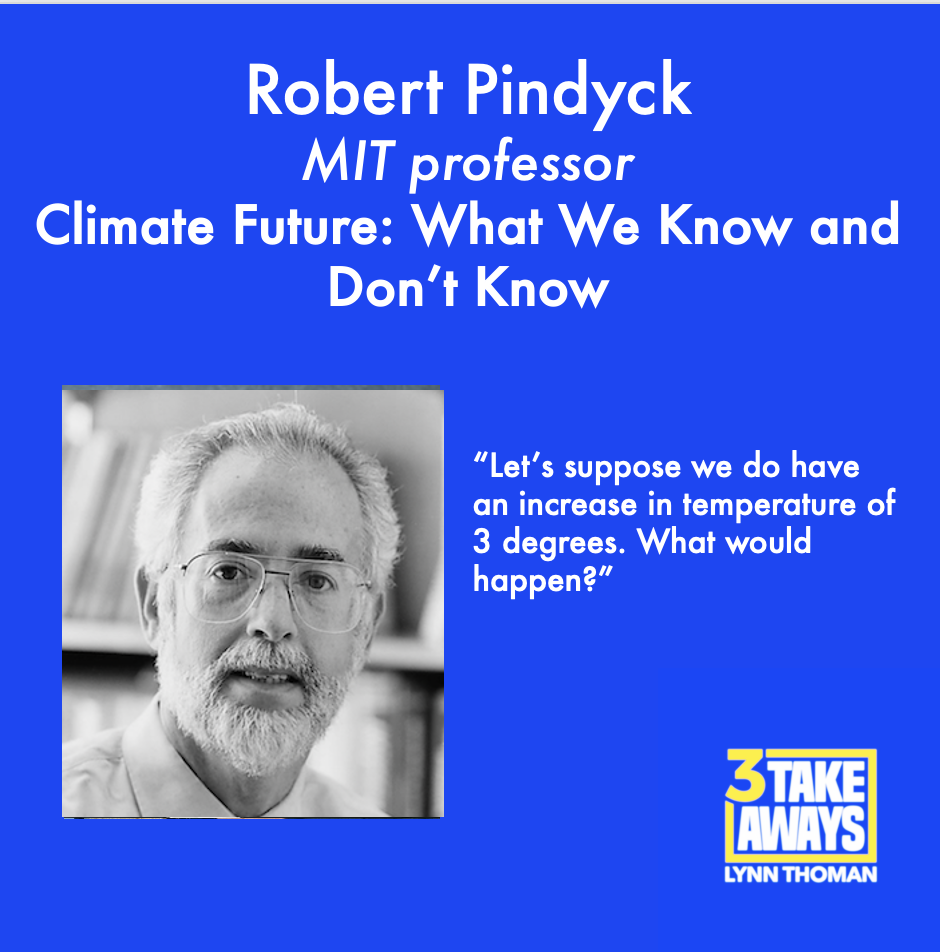
Climate Future: What We Know and Don’t Know with MIT’s Robert Pindyck
Current debates over climate change are focused almost entirely on reducing emissions - which is something we should do - but we also need to answer the question, how should we be adapting?
MIT’s Robert Pindyck shares what we know and don’t know and how we can adapt given the enormous climate uncertainty.
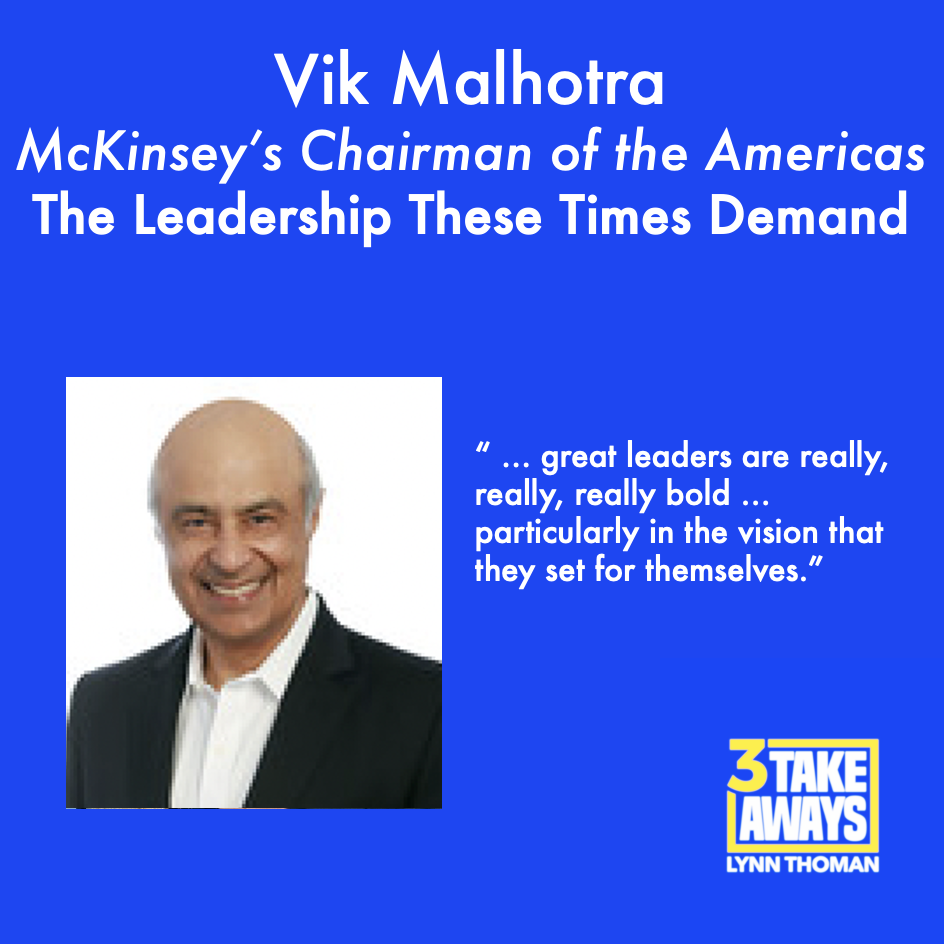
The Leadership These Times Demand – with Vik Malhotra, McKinsey’s Chairman of the Americas
Being a leader of any organization today may be more difficult than ever. What enables some leaders to thrive while others fail? What are some of the qualities and actions vital for success?
Vik Malhotra, McKinsey and Company’s Chairman of the Americas, shares his insights from interviewing and advising today’s elite business leaders. He is a co-author of the New York Times bestseller, CEO Excellence: The Six Mindsets That Distinguish the Best Leaders from the Rest.

When Willpower Isn’t Enough: Psychologist Wendy Wood Reveals Keys to Success
The research is in, and it shows that a large part of being successful is understanding how to form the right habits. In fact, forming habits can be more important than willpower and self-control.
Wendy Wood, noted USC Psychology Professor, shares some of her research findings and simple strategies that enable many people to live successful, satisfying lives. She is the author of Good Habits, Bad Habits: The Science of Making Positive Changes That Stick.
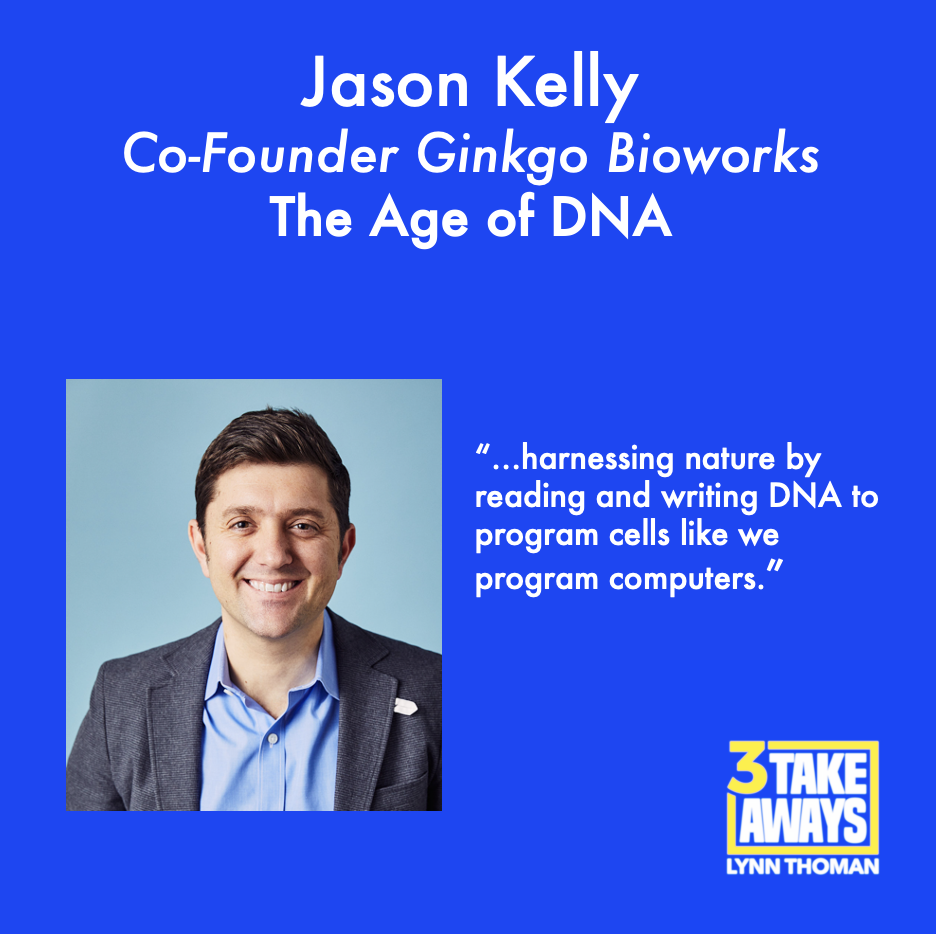
The Age of DNA: Ginkgo Bioworks Co-Founder Jason Kelly
Steve Jobs once said that the biggest innovations in the 21st century would be at the intersection of biology and technology. Nature offers tantalizing examples of the magical properties of biology—self-assembly, self-repair, self-replication and more.
Jason Kelly, co-founder and CEO of Ginkgo Bioworks, shares his dream of harnessing nature by reading and writing DNA to program cells like we program computers.
Ginkgo is a synthetic biology company that programs cells for customers in the pharmaceutical, food, agriculture and energy industries.

Why We Laugh: The Many Shapes and Forms of Laughter with Neuroscientist Sophie Scott
Laughter, it turns out, is not primarily a response to humor. Neuroscientist Sophie Scott CBE shares why we laugh, how it works and the many sins it covers.
We explore how laughter bonds us, where it breaks us, and the ways we use it. We should all bring a greater sense of understanding and intention to our laughter. Sophie Scott is a neuroscientist and professor at UCL whose research focuses on the science of laughter.
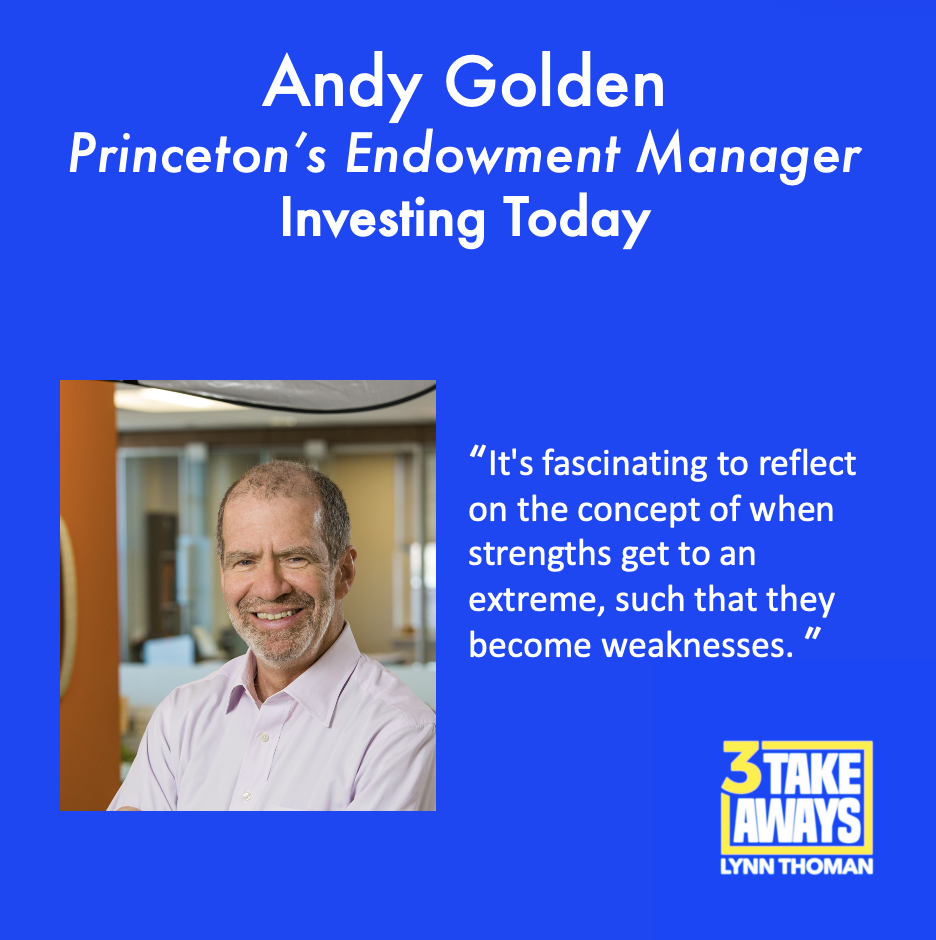
Princeton’s Endowment Manager Andy Golden on Investing Today
The president of Princeton University Investment Company (PRINCO), which manages Princeton’s endowment, talks about investing in today’s world. Andy Golden shares how he selects partners, evaluates investments, and creates a winning environment. PRINCO recently earned nearly a 50% return in a single year.
Andy also explores the differences in long term and short term investing and how a ten year time horizon is short term for endowments. PRINCO is one of the highest performing endowments in the world.
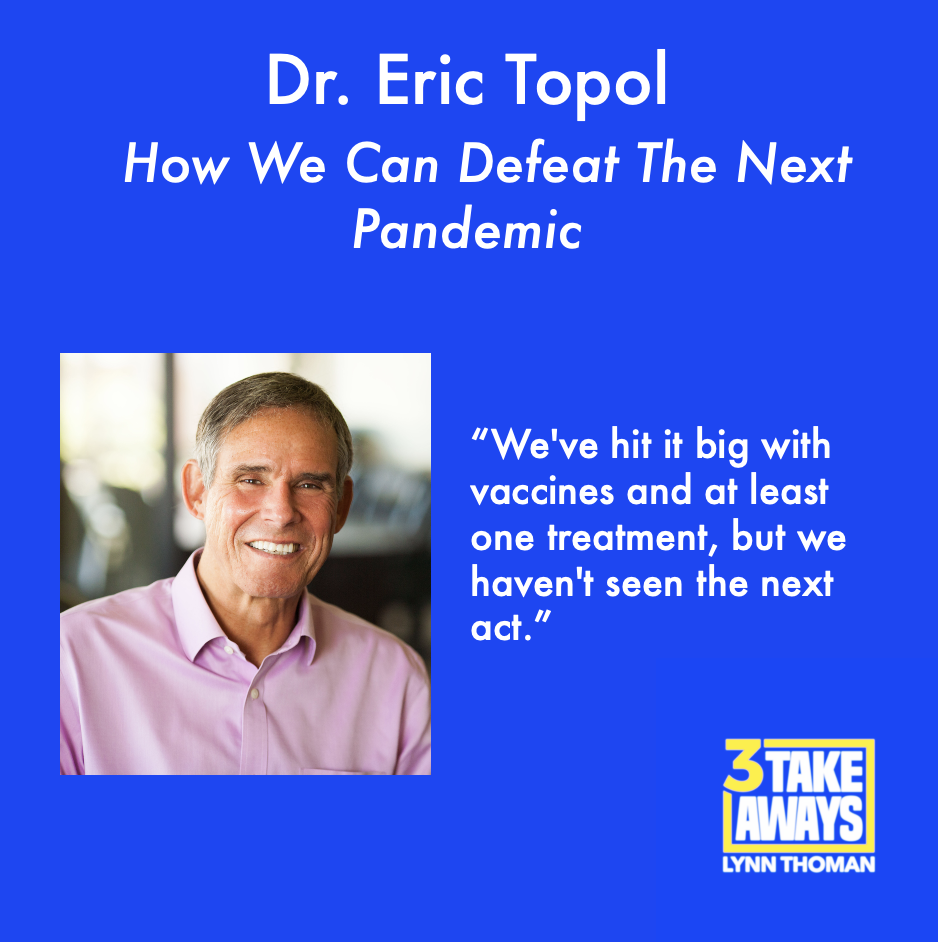
How We Can Defeat The Next Pandemic and The Future of Medicine: Dr. Eric Topol
Dr. Eric Topol explains how we can prepare for the next pandemic, including having stockpiles of variant proof vaccines for the families that are most likely to cause pandemics besides coronavirus and influenza. He also shares recent breakthroughs in medicine which will improve accuracy and diagnosis.
Dr. Topol is the founder of Scripps Research.
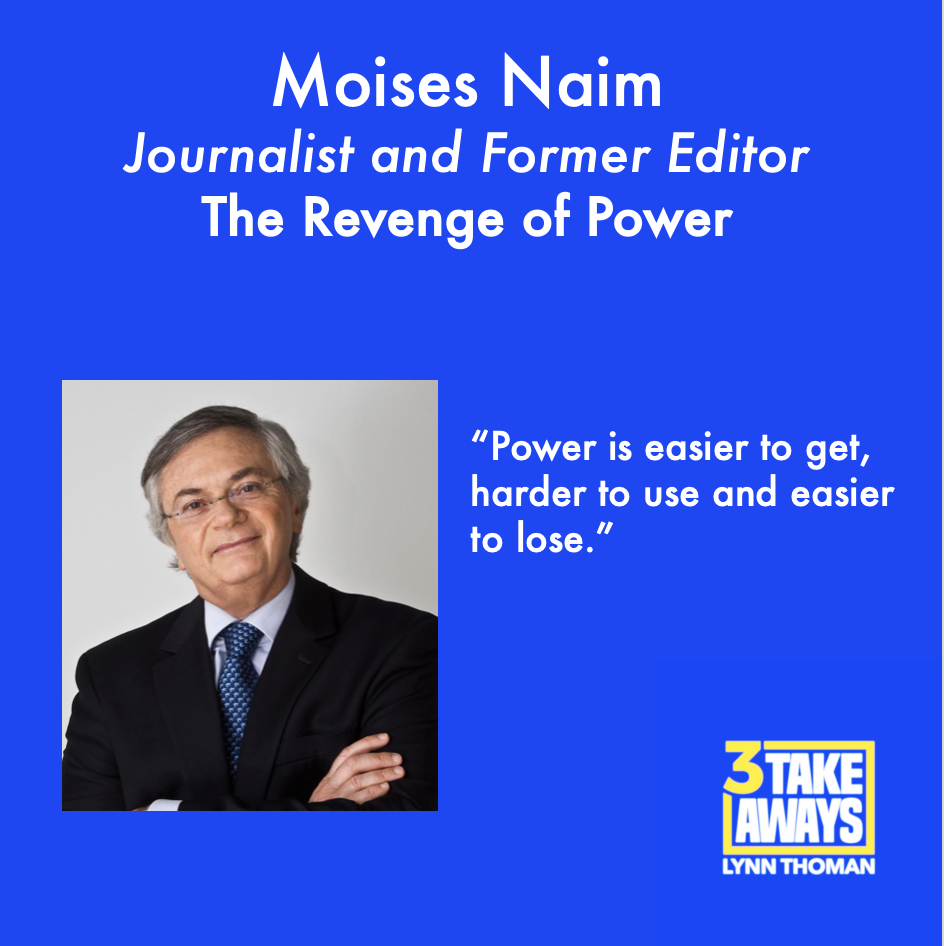
The Revenge of Power: How Power is Shifting in the 21st Century with Moises Naim
Power is easier to get, harder to use and easier to lose. Moises Naim explores how power is changing across all sectors of society. Power has shifted from country leaders to public squares, large companies to start-ups, and large armies to insurgents. Being in charge isn’t what it used to be! But at the same time, power is also concentrating in some sectors. Autocrats are reinventing politics and gaining power using 21st century tools - populism, polarization and post-truths - and undermining democracies around the world.
Moises Naim is a Venezuelan journalist and former editor-in-chief of Foreign Policy magazine. He was Minister of Trade and Industry for Venezuela, director of Venezuela’s Central Bank, and executive director of the World Bank. He is the author of The End of Power and The Revenge of Power.
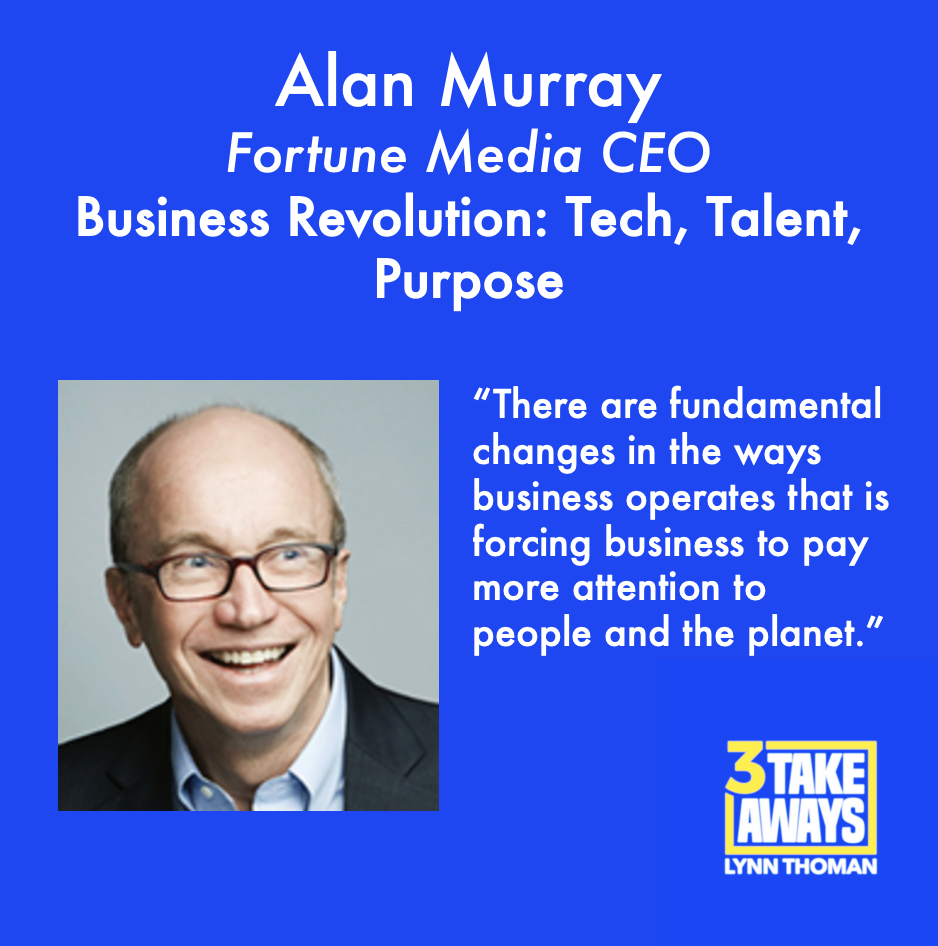
Business Revolution: Tech, Talent, Purpose with Fortune Media CEO Alan Murray
Fortune Media CEO Alan Murray shares the dramatic changes in business today due to the tech revolution, which is disrupting so many businesses, and the purpose revolution which is causing companies to re-think what they should be doing.
He believes that fundamental changes in the ways businesses operate today are forcing them to pay more attention to people and the planet.
It used to be that 80% of the value of the Fortune 500 came from physical assets but now over 85% of the value is intangible assets including intellectual property, software, brand value and the human emotional connection that comes from brand value. Since intangibles, which is where the value lies today, are things that are much more closely tied to people - it's human ingenuity that creates the intellectual property, it's human emotion that creates the brand value and the brand connection - business leaders are paying much more attention to people. Alan shares how that is changing the purpose of corporations and the role of the CEO today.
He also talks about how business has changed due to the pandemic, remote work, Black Lives Matter, rising inequality, global warming and the Ukraine Russia war.
Unless businesses are responsive to their employees, their customers and their communities, Alan believes they will lose. The biggest changes, he says, are yet to come.
His new book is Tomorrow’s Capitalist.
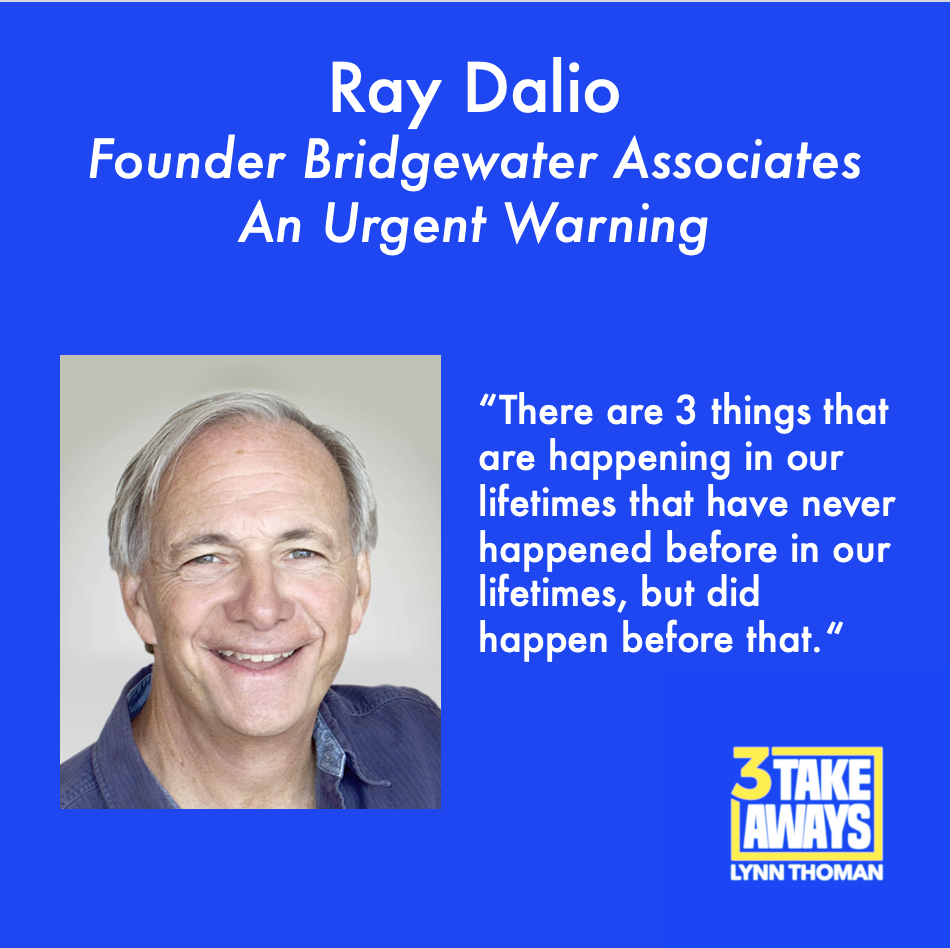
An Urgent Warning on the Times Ahead with the Founder of the World's Largest Hedge Fund: Ray Dalio
Legendary investor Ray Dalio, who predicted the 2008 financial crisis, shares a similar urgent warning about what he sees ahead. He believes the times ahead will be radically different from what everyone today has experienced in their lifetimes, and he wants people to be prepared. Bill Gates said, “…super-provocative, super-important… A lot of facts line-up to create a scary picture that’s hard to refute.”
Based on his study of the rise and fall of superpowers and history’s most turbulent periods, Ray is issuing a warning about the confluence of three major events that last happened between 1930 and 1945.
He talks about debt creation, printing money, inflation, wealth disparity, populism and the rise of a great power to challenge the existing world order.
Ray Dalio founded and built Bridgewater Associates into the largest hedge fund in the world and shares how to protect assets during the tempestuous and inflationary period ahead.
His new book is Principles for Dealing with the Changing World Order: Why Nations Succeed and Fail.

The Secret Life of Words - What Our Words Say About Us and What We Can Learn From Other’s Words: Jamie Pennebaker
Ever wondered if we could predict people’s actions through their words? Renowned social psychologist and linguist Dr Jamie Pennebaker shares how words can give away our secrets, feelings and inner state of mind from Putin’s language which predicted his invasion of Ukraine to poets whose use of the word “I” can predict a higher risk of suicide.
Dr. Pennebaker’s groundbreaking research in computational linguistics analyzing and counting the frequency of words, shows that our most forgettable words, such as pronouns I, me and my, can be the most revealing.
He explains what the words Vladimir Putin, Xi Jinping, and Joe Biden use (and even the ones they don’t use) reveal about their inner feelings and the “tell” that predicted Vladimir Putin’s invasion of Ukraine.
He also talks about how American Presidents have become more likeable and less analytical, the differences in men’s and women's words, and how writing about traumatic experiences can help people heal and improve their physical health.
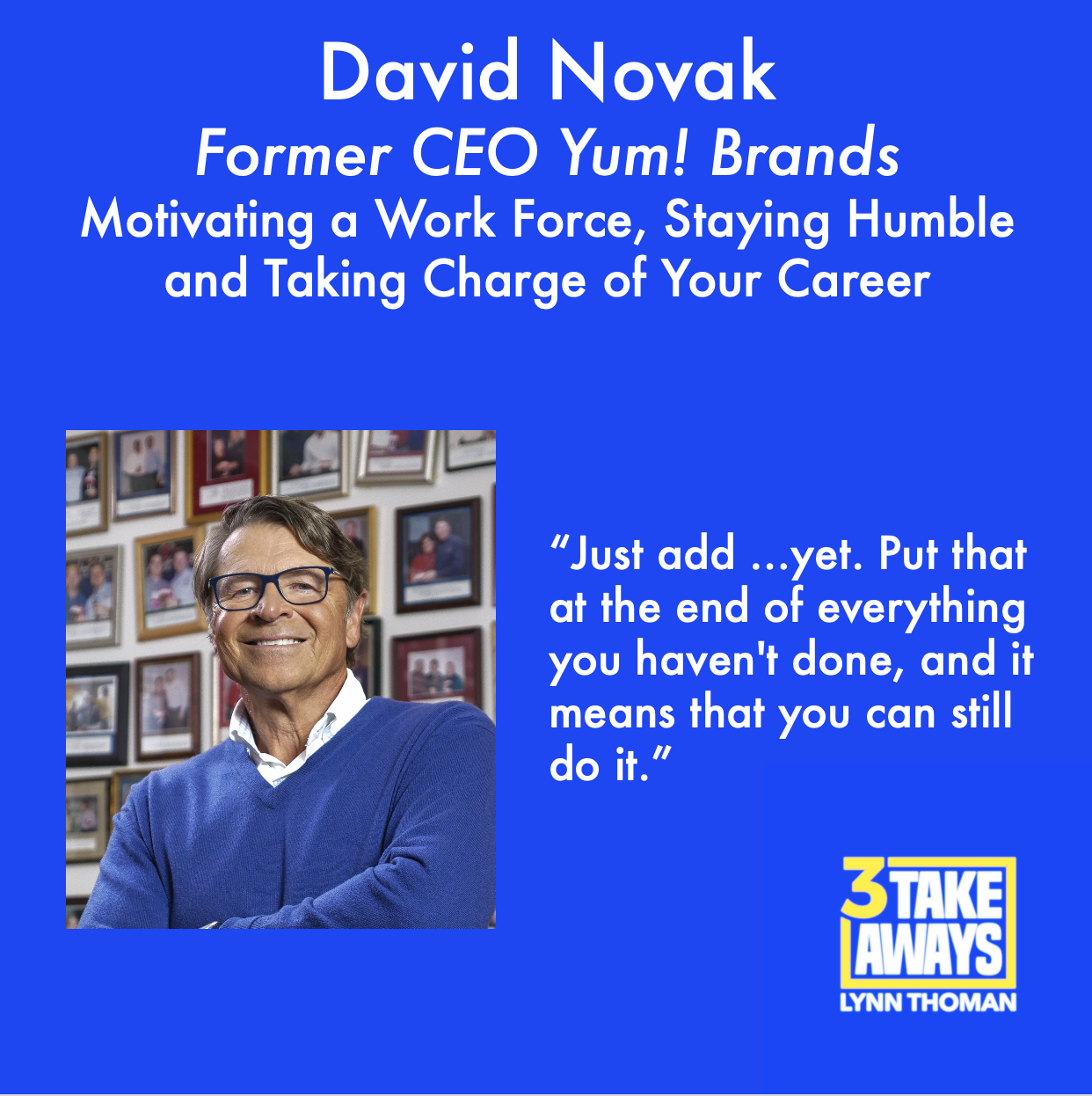
David Novak, Former CEO OF Yum! Brands on Motivating a Work Force, Staying Humble and Taking Charge of Your Career
From humble beginnings growing up as a trailer park nomad, David rose to be the CEO of Yum! Brands (Pizza Hut, Taco Bell and KFC) where his successful techniques as a leader helped double the number of restaurants and increased market capitalization over 8 times. He has been recognized as one of the best performing CEO’s by Barron’s, Fortune and Harvard Business Review.
This week we talked about his people first approach, the essential traits leaders need, the importance of mindset and why purposeful recognition is the strongest motivational tool for leaders in any field. He explains how sometimes we have to say no in order to get what we want, as well as describes why people cried when he gifted them a rubber chicken!
David continues to campaign to create more leaders by creating the student leadership program Lead4Change.
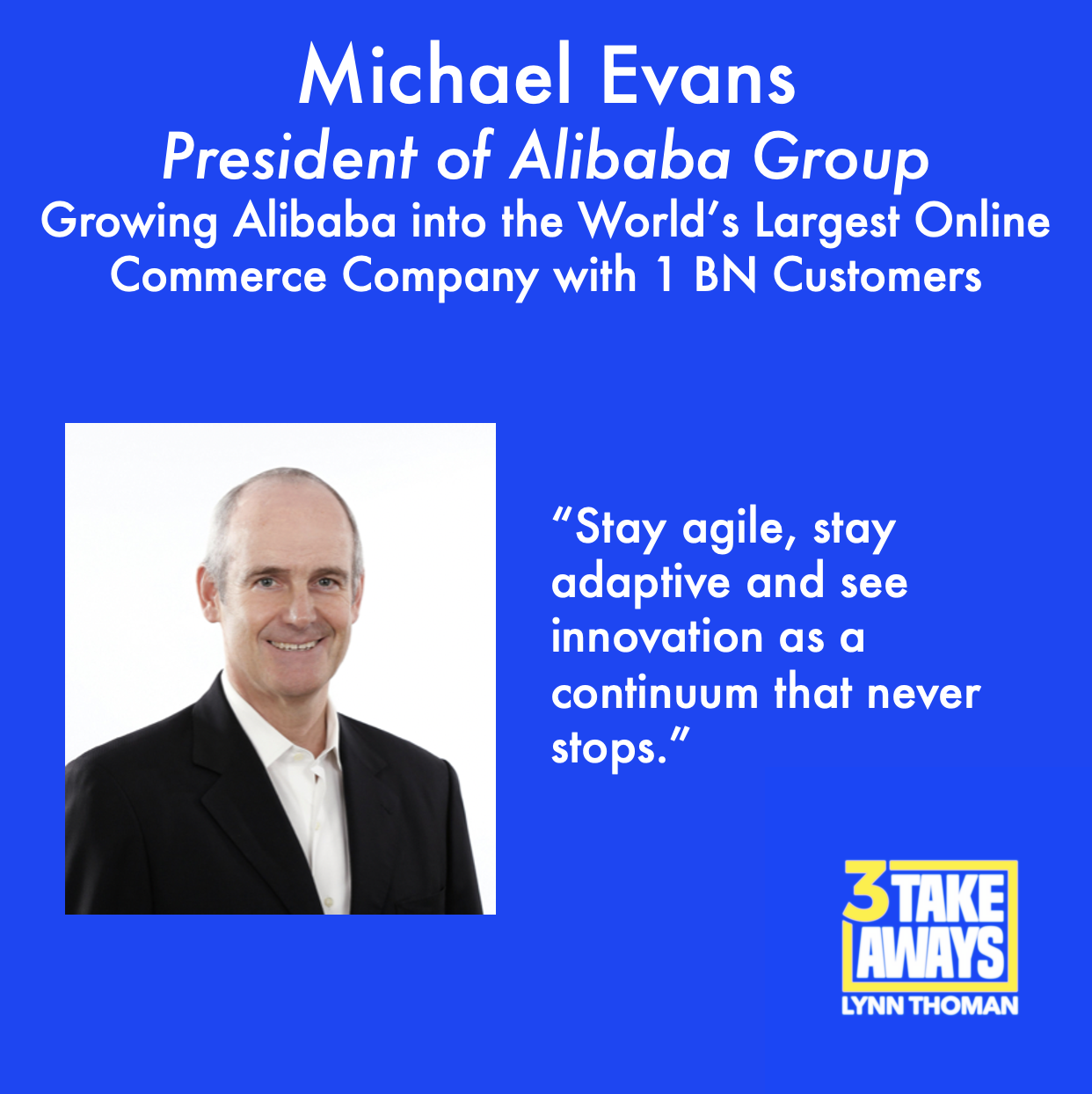
Growing Alibaba into the World's Largest Online Commerce Company with 1 BN Customers: Alibaba Group President Michael Evans
Sometimes, and mostly outside of China, Alibaba is referred to as the Chinese Amazon, but in reality, it’s very different and much larger.
Alibaba Group president Michael Evans shares how Alibaba grew to become the world’s largest online commerce company serving nearly 1 billion customers each month, how it’s different than its Western counterparts, and what international companies need to know in order to succeed in the China consumer market.
Michael also shares how he sees the future of retail and how Alibaba creates new businesses that are innovative and different from what you see elsewhere. He also explains how Alibaba is using its platform to help its merchants understand consumer trends, manufacture more efficiently and make the future greener.
